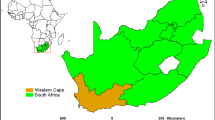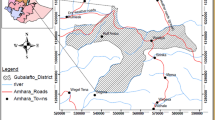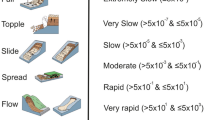Abstract
Land use changes associated with urbanization may increase ecological risk and subsequent geohazard risk. Africa is particularly vulnerable at preset as, since 2005, the highest rates of rapid urbanization-associated forest degradation have occurred there. On August 14, 2017, a compound geohazard in Freetown, Sierra Leone, caused thousands of fatalities and destroyed hundreds of houses. Land use change is considered the main factor contributing to geohazard initiation. Here, we use Freetown as a case study to quantitatively assess the magnitude of the increase in ecological risk associated with land use changes. To achieve the aim, satellite images are used in the case study area from 2007 to 2017, the data are integrated into a geographic information system. A series of indices are then used based on the processed images to describe land use and ecological risk, including dynamic index, trend and state index, and ecological risk index. The results show that Freetown experienced a rapid urbanization process, together with an unbalanced increase in urban land and complex conversion of bare and grass land, from 2007 to 2017. Significantly degenerated forest was converted into urban land (2.77%), bare land (6.47%), and grassland (10.27%), while the ecological risk level increased from low to high. The ecological risk in the affected area of geohazard is found higher than that of the surrounding mountainous area. It indicates that vegetation may reduce the risk of disaster. This result is helpful for the trade-off between urban development and ecological protection and rational urban planning. For disaster resilience and sustainable development of Freetown, and also other rapidly urbanizing cities in mountainous areas, ecological protection must be incorporated into development planning.







Similar content being viewed by others
References
Abhish S, Shri R (2014) A Review on Effects of Deforestation on Landslide: Hill Areas. Int J Sci Res Dev 2:37–46
ACAPS (2017) Briefing Notes Relief Web. August 21, 2017. https://reliefweb.int/sites/reliefweb.int/files/resources/acaps_start_briefing_note_sierra_leone_mudslides_and_floods_170816.pdf.
African Development Bank (2017) African Economic Outlook 2017. https://www.afdb.org/fileadmin/uploads/afdb/Documents/Publications/AEO_2017_Report_Full_English.pdf.
Baldwin DJB, Weaver K, Schnekenburger F, Perera AH (2004) Sensitivity of landscape pattern indices to input data characteristics on real landscapes: implications for their use in natural disturbance emulation. Landsc Ecol 19:255–271. https://doi.org/10.1023/b:land.0000030442.96122.ef
Chen SP, Dong YX, Guo HD (1998) Research on the mechanism of remote sensing information. Science Press, Beijing, pp 338–359 (In Chinese)
Chen C, Zhang LM, Xiao T, He J (2020) Barrier lake bursting and flood routing in the Yarlung Tsangpo Grand Canyon in October 2018. J Hydrol 583:124603. https://doi.org/10.1016/j.jhydrol.2020.124603
Claessens L, Verburg PH, Schoorl JM, Veldkamp A (2006) Contribution of topographically based landslide hazard modelling to the analysis of the spatial distribution and ecology of kauri (Agathis australis). Landsc Ecol 21:63–76. https://doi.org/10.1007/s10980-005-5769-z
Costa MH, Botta A, Cardille JA (2003) Effects of large-scale changes in land cover on the discharge of the Tocantins River, Southeastern Amazonia. J Hydrol 283:206–217. https://doi.org/10.1016/s0022-1694(03)00267-1
Cui YF, Zhou XJ, Guo CX (2017) Experimental study on the moving characteristics of fine grains in wide grading unconsolidated soil under heavy rainfall. J Mt Sci 14(3):417–431. https://doi.org/10.1007/s11629-016-4303-x
Cui YF, Cheng DQ, Choi CE, Jin W, Lei Y, Kargel JS (2019a) The cost of rapid and haphazard urbanization: lessons learned from the Freetown landslide disaster. Landslides:1167–1176. https://doi.org/10.1007/s10346-019-01167-x
Cui YF, Jiang Y, Guo CX (2019b) Investigation of the initiation of shallow failure in widely graded loose soil slopes considering interstitial flow and surface runoff. Landslides 16(4):815–828. https://doi.org/10.1007/s10346-018-01129-9
Dewan AM, Yamaguchi Y (2009) Land use and land cover change in greater Dhaka, Bangladesh: using remote sensing to promote sustainable urbanization. Appl Geogr 29:390–401. https://doi.org/10.1016/j.apgeog.2008.12.005
Diwediga B, Agodzo S, Wala K, Le QB (2017) Assessment of multifunctional landscapes dynamics in the mountain basin of the Mo River. J Geogr Sci 27:579–605. https://doi.org/10.1007/s11442-017-1394-4
Domonik A, Słaby E, Śmigielski M (2010) The Hurst exponent as a tool for the description of magma field heterogeneity reflected in the geochemistry of growing crystals. Acta Geol Pol 60:437–443
Du J, Yang QH (2010) An analysis of regional ecological risk based on land use change and spatial statistics: a case study in Wenchuan, Hubei Province. Remote Sens Land and Resour 22:61–65. https://doi.org/10.7763/IJESD.2016.V7.790
Du YY, Liang F, Sun Y (2012) Integrating spatial relations into case-based reasoning to solve geographic problems. Knowl. -Based Syst 33:111–123. https://doi.org/10.1016/j.knosys.2012.03.002
Eric FL, Turner BL, Helmut JG et al (2001) The causes of land-use and land-cover change: moving beyond the myths. Glob Environ Change 4:261–269. https://doi.org/10.1016/S0959-3780(01)00007-3
(FAO) Food and Agriculture Organization. 2015. Global Forest Resource Assessment 2015. How are the world's forests changing? Rome, Italy
Folega F, Woegan YA, Marra D et al (2015) Long term evaluation of green vegetation cover dynamic in the Atacora Mountain chain (Togo) and its relation to carbon sequestration in West Africa. J Mt Sci 12:921–934. https://doi.org/10.1007/s11629-013-2973-1
Fu BJ, Chen LD, Ma KM, Zhou HF, Wang J (2000) The relationships between land use and soil conditions in the hilly area of the loess plateau in northern Shaanxi, China. CATENA 39:69–78. https://doi.org/10.1016/S0341-8162(99)00084-3
Gong WF, Yuan L, Dang YF (2012) Study on Ecological Risk of Land Use in Urbanization Watershed Based on RS and GIS: A Case Study of Songhua River Watershed in Harbin Section. Chin Agric Sci Bull 28:255–261. https://doi.org/10.3969/j.issn.1000-6850.2012.20.047
Guo CX, Cui YF (2020) Pore structure characteristics of debris flow source material in the Wenchuan earthquake area. Engineering Geology 267:105499. https://doi.org/10.1016/j.enggeo.2020.105499
Han LF, Xu YP, Shi Y (2012) The Effect of Land Use and Land Cover Change on the Stream Structure: Case Study in the Qinhuai River Basin, China. Appl Mech Mater 212–213:186–192. https://doi.org/10.4028/www.scientific.net/amm.212-213.186
Honnay O, Piessens K, Landuyt WV, Hermy M, Gilinck H (2003) Satellite based land use and landscape complexity indices as predictors for regional plant species diversity. Landsc Urban Plan 63:241–250. https://doi.org/10.1016/s0169-2046(02)00194-9
Hossain M, Bujang JS, Zakaria M, Hashim M (2015) Assessment of Landsat 7 Scan Line Corrector-off data gap-filling methods for seagrass distribution mapping. Int J Remote Sens 36:1188–1215. https://doi.org/10.1080/01431161.2015.1007257
Hu XL, Lu L, Li X, Wang JH, Lu XG (2015) Ejin Oasis land use and vegetation change between 2000 and 2011: the role of the Ecological water diversion project. Energies 8(7):7040–7057. https://doi.org/10.3390/en8077040
Huang BQ, Huang JL, Pontius R, Tu ZS (2018) Comparison of Intensity Analysis and the land use dynamic degrees to measure land changes outside versus inside the coastal zone of Longhai, China. Ecol Indic 89:336–347. https://doi.org/10.1016/j.ecolind.2017.12.057
Jaeger JAG (2000) Landscape division, splitting index, and effective mesh size: new measures of landscape fragmentation. Landsc Ecol 15:115–130. https://doi.org/10.1023/A:100812932
Jean A, Jean C, Patrick Z, Hedi H (2011) Role of the Mediterranean forest in soil and water conservation: a challenging balance. In Yves B, Carlos G &Marc P (Eds.), Water for Forests & People in the Mediterranean A Challenging Balance (pp. 43–52). European Forest Institute
Kapos V, Rhind J, Edwards M, Price MF, Ravilious C (2000) Developing a map of the world's mountain forests. In: Price MF, Butt N (eds) Forests in sustainable mountain development: a state of knowledge report for 2000. CAB International, Wallingford, pp 4–9. https://doi.org/10.1079/9780851994468.0004
Kumar SV, Bhagavanulu DVS (2008) Effect of deforestation on landslides in Nilgiris district — A case study. J Indian Soc Remote Sens 36(1):105–108. https://doi.org/10.1007/s12524-008-0011-5
Li G, Lei Y, Yao H, Wu S, Ge J (2017) The influence of land urbanization on landslides: An empirical estimation based on Chinese provincial panel data. Sci Total Environ 595:681–690. https://doi.org/10.1016/j.scitotenv.2017.03.258
Li QH, Chen YN, Shen YJ, Li CH, Xu JH (2011) Spatial and temporal trends of climate change in Xinjiang, China. J Geogr Sci 21:1007–1018. https://doi.org/10.1007/s11442-011-0896-8
Li X. B (1996) A Review of the International Researches on Land Use/Land Cover Change. Acta Geogr Sinica 6: 553–558. URL: http://www.geog.com.cn/EN/10.11821/xb199606009
Li Y, Gong WF, Dang YF, Long ZX (2013) Study on ecological risk of land use in urbanization watershed based on RS and GIS: a case study of Songhua river watershed in Harbin section. Asian Agri Res: 61-65
Locatelli L, Mark O, Mikkelsen PS, Arnbjerg-Nielsen K, Deletic A, Roldin M, Binning PJ (2017) Hydrologic impact of urbanization with extensive stormwater infiltration. J Hydrol 544:524–537. https://doi.org/10.1016/j.jhydrol.2016.11.030
Luo GP, Zhou CH, Chen X (2003) Process of land use/cover change in arid region oases. Acta Geogr Sinica 58:63–71. (In Chinese). https://doi.org/10.3321/j.issn:0375-5444.2003.01.008
Luo GP, Zhou CH, Chen X, Li Y (2008) A methodology of characterizing status and trend of land changes in oases: A case study of Sangong River watershed, Xinjiang, China. J Environ Manage 88(4):775–783. https://doi.org/10.1016/j.jenvman.2007.04.003
Mandelbrot BB, Wallis JR (1969) Robustness of the rescaled range R/S in the measurement of noncyclic long run statistical dependence. Water Resour Res 5(5):967–988. https://doi.org/10.1029/wr005i005p00967
Neill ORV, Hunsaker CT, Timmins SP, Jackson BL, Jones KB, Riitters KH, Wickham JD (1996) Scale problems in reporting landscape pattern at the regional scale. Landsc Ecol 11:169–180. https://doi.org/10.1007/bf02447515
Ng CWW, Ni JJ, Leung AK, Zhou C, Wang ZJ (2016) Effects of planting density on tree growth and induced soil suction. Géotechnique 66(9):711–724. https://doi.org/10.1680/jgeot.15.P.196
Ng CWW, Ni JJ, Leung AK (2019) Effects of plant growth and spacing on soil hydrological changes: A field study. Géotechnique. https://doi.org/10.1680/jgeot.18.P.207
Ning JC, Liu G, Liu Q, Xie C (2010) Land use change and ecological environment evolution in Taihu Lake Basin. Int Conf Geoinformatics IEEE:1–6. https://doi.org/10.1109/geoinformatics.2010.5567519
Ouyang CJ, An HC, Zhou S, Wang ZW et al (2019) Insights from the failure and dynamic characteristics of two sequential landslides at Baige village along the Jinsha River, China. Landslides 16(7):1397–1414. https://doi.org/10.1007/s10346-019-01177-9
Paltrinieri N, Comfort L, Reniers G (2019) Learning about risk: Machine learning for risk assessment. Safety Sci:118. https://doi.org/10.1016/j.ssci.2019.06.001
Pearsons TN, Murdoch AR, Mackey G, Murdoch KG, Hillman TW, Cooper MR, Miller JL (2012) Ecological risk assessment of multiple hatchery programs in the upper Columbia Watershed using Delphi and modeling approaches. Environ Biol Fishes 94(1):87–100. https://doi.org/10.1007/s10641-011-9884-1
PEDRR (2010) Demonstrating the Role of Ecosystem-based Management for Disaster Risk Reduction. Partnership for Environment and Disaster Risk Reduction. https://www.preventionweb.net/english/hyogo/gar/2011/en/bgdocs/PEDRR_2010.pdf
Qiu HJ, Cao MM, Wang YM, Liu W, Hu S (2013) The trend and periodicity of drought disaster in china in recent 60 years. Quat Sci 23:1183–1190. https://doi.org/10.3969/j.issn.1001-7410.2013.06.14
Rahmati O, Tahmasebipour N, Haghizadeh A et al (2017) Evaluation of different machine learning models for predicting and mapping the susceptibility of gully erosion. Geomorphology:S0169555X16308418. https://doi.org/10.1016/j.geomorph.2017.09.006
Rahmati O, Yousefi S, Kalantari Z et al (2019) Multi-Hazard Exposure Mapping Using Machine Learning Techniques: A Case Study from Iran. Remote Sens 11(16):1943. https://doi.org/10.3390/rs11161943
Rastandeh A, Zari MP (2018) A spatial analysis of land cover patterns and its implications for urban avifauna persistence under climate change. Landsc Ecol 33(3):1–20. https://doi.org/10.1007/s10980-018-0613-4
Saura S, Pascual-Hortal L (2007) A new habitat availability index to integrate connectivity in landscape conservation planning: comparison with existing indices and application to a case study. Landsc Urban Plan 83(2–3):91–103. https://doi.org/10.1016/j.landurbplan.2007.03.005
Shi XS, Nie J, Zhao J, Gao Y (2020) A homogenization equation for the small strain stiffness of gap-graded granular materials. Comput Geotech 121:103440
Sierra Leone. (2015). Population and Housing Census Final Results. https://www.statistics.sl/images/StatisticsSL/Documents/final-results_-2015_population_and_housing_census.pdf
Tian Y, Jim CY, Wang H (2014) Assessing the landscape and ecological quality of urban green spaces in a compact city. Landsc Urban Plan 121:97–108
Tong GC, Lin J, Chen H, Gu ZY, Tang P, Zhang JC (2017) Land use and landscape pattern changes and the driving force factors in Nanjing from 1986 to 2013. Res Soil Water Conserv 24:240–245. (in Chinese). https://doi.org/10.13869/j.cnki.rswc.2017.02.039
(UNITAR) United Nations Institute for Training and Research (2017) Preliminary landslide inventory of Freetown, Sierra Leone 18 August 2017. http://www.unitar.org/unosat/node/44/2646?utm_source=unosat-unitar&utm_medium=rss&utm_campaign=maps
University of Texas Libraries (2005) Sierra Leone (Political) country maps. http://www.lib.utexas.edu/maps/sierra_leone.html
USGS (US Geological Survey) (2004) Phase 2 Gap-Fill Algorithm: SLC-Off Gap-Filled Products Gap-Fill Algorithm Methodology. http://landsat.usgs.gov/documents/ L7SLCGapFilledMethod.pdf
Wang L (2017) Ecological risk assessment based on land use change in shanghai city. J Agric Sci 38:1–7. https://doi.org/10.13907/j.cnki.nykxyj.20171020.002
Wang Q, Yang ZY, Sun GY (1999) Study on the methods of land use dynamic change research. 18:81–Prog Geogr, 87. https://doi.org/10.11820/dlkxjz.1999.01.012
Wang YZ, Li B, Wang RQ, Su J, Rong XX (2011) Application of the Hurst exponent in ecology. Comput Math Appl 61:2129–2131. https://doi.org/10.1016/j.camwa.2010.08.095
Wei Q, Dobigeon N, Tourneret JY (2015) Bayesian fusion of multi-band images. IEEE J Sel Top Signal Process 9:1117–1127. https://doi.org/10.1109/JSTSP.2015.2407855
Williams J, Saunders D. A (2003) Land use and natural ecosystems: A revolution in land use is the key to a sustainable landscape. http://wentworthgroup.org/wp-content/uploads/2013/09/Williams_Saunders-Land-Use-Natural-Ecosystems.pdf
World Bank (2017a) Sierra Leone Rapid Damage and Loss Assessment of August 14th, 2017 - Landslides and Floods in the Western Area https://reliefweb.int/sites/reliefweb.int/files/resources/19371_Sierra_Leone_DaLA_Web-forprinting.pdf
World Bank (2017b) World Development Indicators. http://databank.worldbank.org/data/reports.aspx? Code=NY.GDP.MKTP.KD.ZG&id=1ff4a498&report_name=Popular-Indicators&populartype=series&ispopular=y
Wu J, Chen P, Wen CX, Fu SF, Chen QH (2014) Ecological risk assessment of land use based on exploratory spatial data analysis (ESDA): A case study of Haitan Island, Fujian Province. Chin J Appl Ecol 25:2056–2062. (In Chinese). https://doi.org/10.13287/j.1001-9332.20140425.004
Wu J. G (2000) Landscape Ecology—Pattern, Process, Scale and Hierarchy, High Education Press, Beijing. (In Chinese)
Xiao LM, Zhang YH, Peng GZ (2018) Landslide susceptibility assessment using integrated deep learning algorithm along the China-Nepal highway. Sensors 18(12):4436. https://doi.org/10.3390/s18124436
Xie H, Wang P, Huang H (2013) Ecological Risk Assessment of Land Use Change in the Poyang Lake Eco-economic Zone, China. Int J Environ Res Public Health 10(1):328–346. https://doi.org/10.3390/ijerph10010328
Xu MZ, Bogen J, Wang ZY, Bønsnes TE, Gytri S (2015) Pro-glacial lake sedimentation from jökulhlaups (GLOF), Blåmannsisen, northern Norway. Earth Surf Proc Land 40(5):654–665.https://doi.org/10.1002/esp.3664
Xu Y, Zhong YX, Feng XH, Xu LT, Zheng L (2016) Ecological risk pattern of Poyang Lake Basin based on land use. Acta Ecol Sinica 36:7850–7857. https://doi.org/10.5846/stxb201512152507
Ye CS, Feng YF (2013) Ecological risk assessment for Pearl River Delta based on land use change. Trans Chin Soc Agric Eng 29:224–232. (In Chinese. https://doi.org/10.3969/j.issn.1002-6819.2013.19.028
Yin GQ, Li X, Huang YY, Si Y, Wei JH, Liu JH, Bai R (2016) Ecosystem stability analysis with LUDC model and transitional area ratio index for Xihu oasis in Dunhuang, China. Environ Earth Sci 75(8):707. https://doi.org/10.1007/s12665-016-5420-0
Zhang H, Li H, Zhen C (2011) Analysis of Land Use Dynamic Change and Its Impact on the Water Environment in Yunnan Plateau Lake Area –– A Case Study of the Dianchi Lake Drainage Area. Procedia Environ Sci 10:2709–2717. https://doi.org/10.1016/j.proenv.2011.09.421
Zhang CD, Xu MZ, Hassan MA et al (2019) Experiment on morphological and hydraulic adjustments of step-pool unit to flow increase. Earth Surf Proc Land 45(2):280–294. https://doi.org/10.1002/esp.4722
Zhen S, Dong LQ, Zheg RM, Yao PJ (2017) Landscape Patterns of Marsh Wetlands in Zoigê Plateaun in 2007 and 2016 and Change. Wetland Sci 15:522–525. https://doi.org/10.13248/j.cnki.wetlandsci.2017.04.007
Zhou Y, Liu Y, Wu W, Li N (2015) Integrated risk assessment of multi-hazards in China. Nat Hazards 78(1):257–280. https://doi.org/10.1007/s11069-015-1713-y
Zhou ZX, Gong J (2018) Automated residential building detection from airborne lidar data with deep neural networks. Adv Eng Inform 36:229–241. https://doi.org/10.1016/j.aei.2018.04.002
Zhou XD, Xu MZ, Wang ZY et al (2019) Debris-flow deposits on a major river influence aquatic habitats and benthic macroinvertebrate assemblages. Freshwater Sci 38(4):713–724. https://doi.org/10.1086/706040
Acknowledgments
The study here is funded by the National Natural Science Foundation of China (41941019) and Major Program of National Natural Science Foundation of China (41790432), and the Key Research Program of Frontier Sciences, CAS (QYZDY-SSW-DQC006). The authors also appreciated the Sichuan Science and Technology program (2019YFH0040).
Author information
Authors and Affiliations
Corresponding author
Rights and permissions
About this article
Cite this article
Jin, W., Cui, Y., Wu, S. et al. Ecological risk resonance of urbanization and its effect on geohazard disaster: the case of Freetown, Sierra Leone. Urban Ecosyst 23, 1141–1152 (2020). https://doi.org/10.1007/s11252-020-00989-1
Published:
Issue Date:
DOI: https://doi.org/10.1007/s11252-020-00989-1




